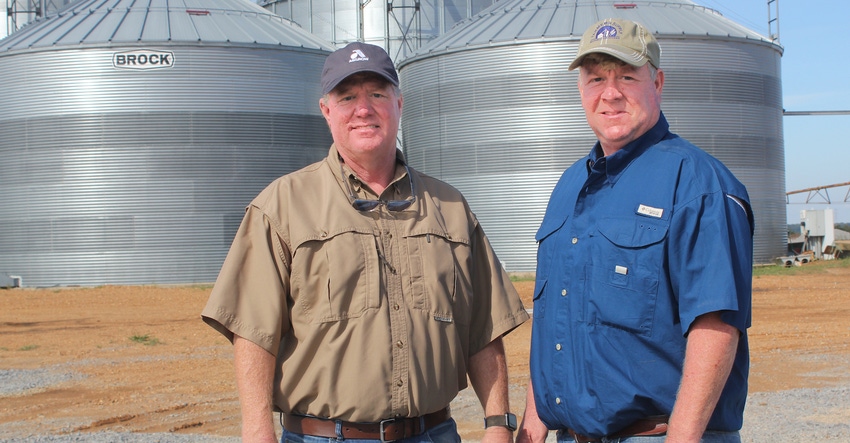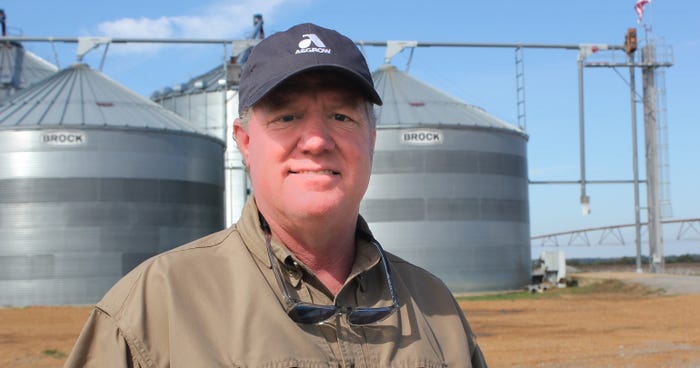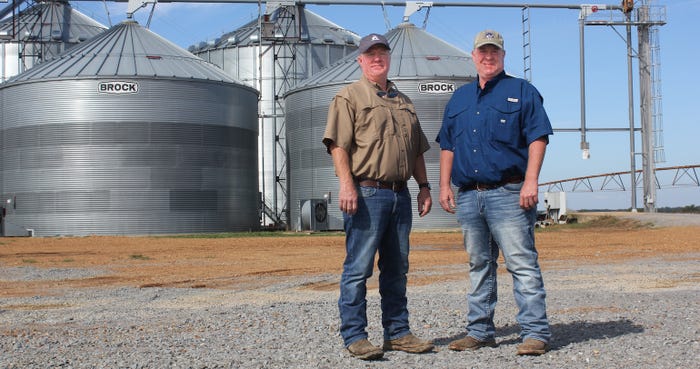
Records are made to be broken, and brothers Neil and Blake Culp shattered a big one this harvest.
On Sept. 13, the Culps, who farm in Phillips County, Ark., along with Neil’s wife, Jill, set a state record for soybean yield when they recorded 130.784 bu/a in the annual Grow for the Green Soybean Yield Challenge.
“I knew they were good beans,” Neil said. “They had looked good all year. I was excited to cut them, and when I made the first pass, I knew we had broken the 100 bu/a mark, but even I was surprised at the final number.”
Neil asked University of Arkansas Extension agents Shawn Payne and Ernest Bradley to measure the field a second time — and then a third time — to be absolutely certain. There was no mistake. He was the new record holder.
“This is an amazing accomplishment, especially with the difficult conditions we experienced here in Arkansas during 2021,” said Jeremy Ross, Extension soybean agronomist with the University of Arkansas System Division of Agriculture.
The Culps 130 bu/a breaks the previous state record of 120.533 bu/a set in 2019 by Matt Miles of Desha County, Ark. Culp is only the 24th producer to claim a spot in Arkansas’ 100 Bushel Club. The state soybean average is around 50 bu/a.
The Culps have participated in the yield challenge before. Last year Neil hit 97 bu/a, which earned first place in the East Central Delta division.

“Hitting 100 bushels has been a goal of mine since they came out with the soybean yield contest,” said Neil, “but I really didn’t do anything different this year than I do any other year. It was the perfect bean, on the perfect soil, with the perfect weather, and God did the rest. He gets all the credit.”
Achieving 100+ soybeans
The winning soybeans were an Asgrow 45X8 variety planted on April 13. Culp strives to plant all his soybeans in early April.
“We try to start planting soybeans on April 1 if we can,” Neil said. “It seems like our first of April beans are the better beans. Once you get past a May 10 planting date, we start to see a yield drop. We try to plant as much as we can in that April 1 – April 15 window and worry about cutting them later.”
The Culps’ soybeans were planted at 130,000 population rate on 30-inch rows with furrow irrigation. Stand counts measured 110,000 plants — an 85% emergence rate.
Crop rotation is a major factor in achieving high-yield soybeans, according to Neil.
“We are very intentional with our crop rotation,” Neil said. “I think crop rotation may be the biggest factor in increasing soil fertility and producing high-yielding crops.”
For weed control, the Culps put out a pre-emergence herbicide behind the planter. They sprayed the winning soybeans once post-emergence with glyphosate/dicamba. The beans also received one foliar application of insecticide and fungicide. They were watered four times.
“I did put out fungicide a little earlier. I usually do it at R5 stage, but I did it at R3 this year,” Neil said. “My intentions were to apply fungicide twice, once at R3 and again at R6, to keep them super healthy, but with weather, and getting behind spraying other things, we only made one fungicide application.”
The Culps have also been experimenting with a new liquid carbon-based fertilizer marketed by Fluid Growth Solutions. They saw big increases in rice yields in 2020 where they applied the carbon-based fertilizer. In 2021 they put across every crop acre. They applied 4 gallons to the acre of the liquid fertilizer on the fields where he grew the record-breaking soybeans.
While the Culps only made some minor tweaks to his soybean production practices this year, Robert Goodson, Phillips County Extension agent said the Culps are reaping the success of years of good farming practices.
“They’re very diligent in what they do, and they’re excellent producers. They have good fertility, and they take care of their farm,” Goodson said.
One other practice to which the Culps faithfully adheres — prayer.
“We try to be intentional in what we do, and we intentionally pray over the seed,” Neil said. “I don’t know why the Lord blessed us, but I want to give Him all the credit.”

2021 weather
For all the blessings 2021 brought the Culp farm, it was not a year without trials. Most notably a June storm that dumped more than 10 inches of rain on the farm in less than 24 hours.
“It was really a great year until the flooding on June 9,” Neil recalled. “Planting was actually really easy. Then we caught timely rain showers along the way to help everything get up and get the chemicals activated. Outside of that one bad rain spell, we had excellent weather.”
But that one bad rain spell took its toll — destroying more than 1,200 acres of the Culps’ soybeans that were already knee-high.
“From that point on we were playing catch up to get everything replanted. We finally finished replanting on July 10,” Neil said.
Obviously, the winning soybean field was on higher ground and escaped the flood damage. Another reason the Culps are counting their blessings.
“God is the number one reason,” Neil said. “He gets all the credit.”
Grow for the Green
The Grow for the Green Soybean Yield Challenge is funded by the Arkansas Soybean Promotion Board using producer checkoff funds and is managed by the Arkansas Soybean Association. The University of Arkansas System Division of Agriculture provides information to producers and extension agents serve as judges. The contest fields consist of five to seven acres and must have been planted in soybean at least once in the previous three years.
Neil will be recognized at the Arkansas Soybean Association’s annual meeting in January 2022. After years of chasing the elusive 100 bu/a mark, will he retire from the contest?
“I guess I can retire, because I don’t know that I’ll ever beat 130 bu/a,” he said. “But then again, you never know.”
“I do know that eventually someone will break this record,” he added. “I’m grateful and blessed to be able to hold the record for a time.”
About the Author(s)
You May Also Like






